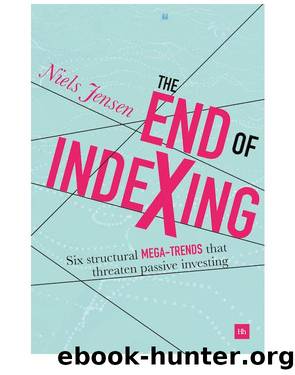The end of indexing by Unknown

Author:Unknown
Language: eng
Format: epub
Published: 2022-02-21T00:00:00+00:00
3.00%
5.00%
7.00%
Annual US GDP Growth
1.00%
2047
2032
2027
1.50%
2057
2034
2028
2.50%
n/a
2041
2030
Source: Absolute Return Partners LLP
Other sources of power
If the anticipated shift in economic power from West to East is not that many years away, neither may we be far away from a shift in overall power. That view is further reinforced when looking at the other sources of power.
Since the Global Financial Crisis, risk tolerance in the West has been in decline. In the US, recent administrations have clearly been more risk-averse than what used to be the case, although President Trump seems to be willing to reverse that trend.
European governments, which have been noticeably more risk-averse than US administrations for many years, havenât exactly picked up the baton left behind by the US under Obama. Take Africa â while both Europe and the US have struggled in the aftermath of the Global Financial Crisis, China has roamed freely in Africa, pretty much unchallenged.
Looking forward, as people age and demand for social welfare programmes rise, I would fully expect risk tolerance to continue to decline. Domestic challenges will simply reduce the Westâs appetite for risk internationally.
As a natural consequence of falling risk tolerance, the threat power is also in decline. Under President Obama, the US made an unusually low number of credible threats (ISIS kept them busy), and a very risk-averse Europe made virtually none. Meanwhile, China was busy making credible threats in Asia. In 2011, China collided with Japan in the South China Sea and, only a few years later, the Chinese played silly games again â this time with the Philippines being the counterparty.
Finally, as far as coalition power is concerned, there appears to be a growing perception in the West that perhaps we shouldnât rely on our traditional coalition partners the way we have done for many years. Washington clearly doesnât rate the relationship with Europe as highly as it used to and, in Europe, ever since the Eurozone crisis blew up in 2011, the focus has been on keeping the Eurozone together rather than nurturing the relationship with the US.
More recently, the UKâs decision to leave the EU hasnât exactly strengthened coalition powers in the West. Meanwhile, China has been very busy strengthening its own coalition powers â particularly in Africa, where it used to be non-existent. Consequently, it would only be fair to conclude that Chinaâs overall power is unquestionably rising and that, by association if for no other reason, the overall power of the East is rising.
Chinaâs likely impact on the rest of Asia
Over the past few centuries, several economic powerhouses have been launched. In the Industrial Revolution, England was the economic superpower and the driver of growth. Following World War I, the US took over and has since been the superpower of the world. I am struggling to see why China couldnât become the global superpower one day and thus have a massive effect on the rest of Asia.
As already pointed out, the very first consumer good that is positively affected by rising per capita income is food. Next comes housing â as people migrate to urban areas, housing is very much in demand.
Download
This site does not store any files on its server. We only index and link to content provided by other sites. Please contact the content providers to delete copyright contents if any and email us, we'll remove relevant links or contents immediately.
| Analysis & Strategy | Bonds |
| Commodities | Derivatives |
| Futures | Introduction |
| Mutual Funds | Online Trading |
| Options | Portfolio Management |
| Real Estate | Stocks |
Rich Dad Poor Dad by Robert T. Kiyosaki(6632)
Pioneering Portfolio Management by David F. Swensen(6300)
How To Win Friends and Influence People by Dale Carnegie(4513)
The Money Culture by Michael Lewis(4207)
The Dhandho Investor by Mohnish Pabrai(3765)
The Wisdom of Finance by Mihir Desai(3747)
Liar's Poker by Michael Lewis(3449)
Fooled by Randomness: The Hidden Role of Chance in Life and in the Markets by Nassim Nicholas Taleb(3124)
The ONE Thing by Gary Keller(3071)
Mastering Bitcoin: Programming the Open Blockchain by Andreas M. Antonopoulos(3045)
The Intelligent Investor by Benjamin Graham Jason Zweig(3041)
The Psychology of Money by Morgan Housel(3036)
Rich Dad Poor Dad: What The Rich Teach Their Kids About Money - That The Poor And Middle Class Do Not! by Robert T. Kiyosaki(2958)
Investing For Dummies by Eric Tyson(2954)
How to Day Trade for a Living: Tools, Tactics, Money Management, Discipline and Trading Psychology by Andrew Aziz(2949)
How to Win Friends and Influence People by Dale Carnegie(2915)
Market Wizards by Jack D. Schwager(2700)
How to Pay Zero Taxes, 2018 by Jeff A. Schnepper(2655)
Zero Hour by Harry S. Dent Jr. & Andrew Pancholi(2647)
